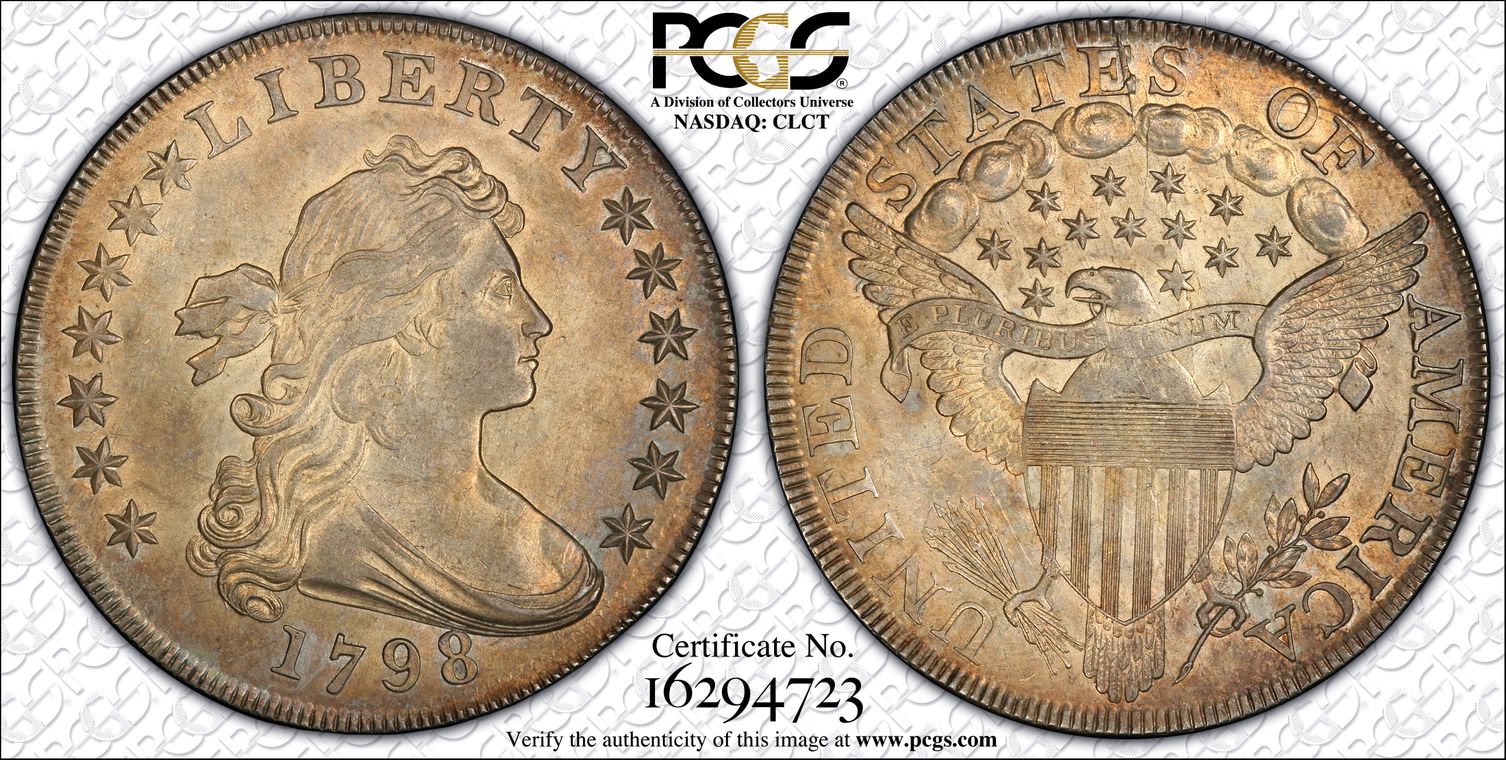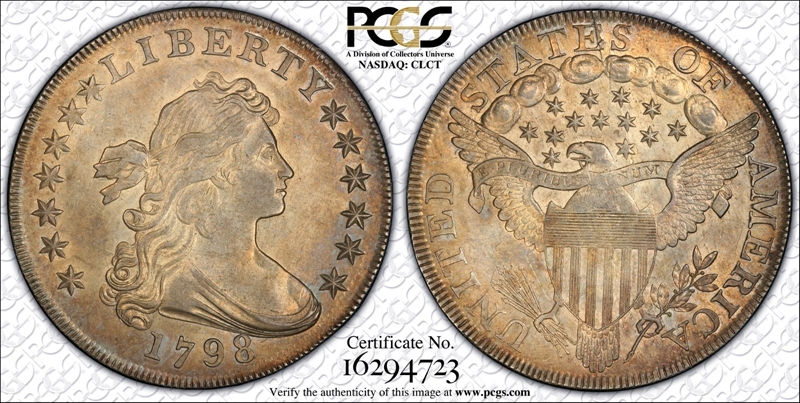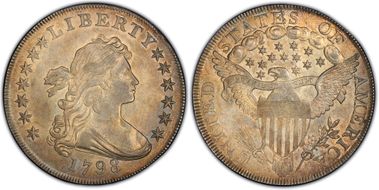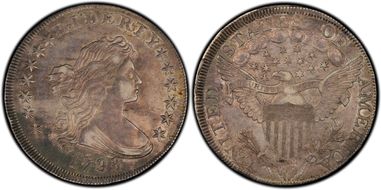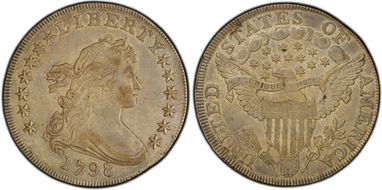1798 $1 BB-104 MS61 认证号16294723, PCGS号40021
拥有者评论
B-22 BB-104 Wide Date. 1798 Possibly the finest 1 or 2 specimen known. Great luster and nice even golden toning. R4. Est. pop. 100-250 coins.
专家评论
Q. David Bowers
The following narrative, with minor editing, is from my "Silver Dollars & Trade Dollars of the United States: A Complete Encyclopedia" (Wolfeboro, NH: Bowers and Merena Galleries, Inc., 1993). Note: the Notable Specimens list should be used with caution - it has been updated in my 2013 edition of "The Encyclopedia of United States Silver Dollars 1794-1804."B-22. H-22.
OBVERSE 7: Wide date, the 8 firmly united with bust. This die is similar to BB-101, but the upper stars, while near Land Y, are not as close to them as in BB-101; on this the 7th star points directly at the lower left serif end of L, while on BB-101 the star points slightly above the serif end. Second star points to a space between two denticles, third to left part of a denticle. Flaw on star 4. Slight die crack under Y and 8th and 9th stars, shows on some specimens.
Obverse die used to strike 1798 BB-104 (early state) and BB-105 (early and late states).
REVERSE G: See description under 1798 BB-103. Bolender said nothing about the die state of the reverse in the mating that created BB-104, except that BB-104 was struck "from same die as Bolender- 18" (equivalent to BB-103). However, Haseltine in 1881 stated that the reverse had a die crack from the rim through the E of STATES, but said nothing about any other cracks. Some specimens of BB-103 were struck from this die in perfect condition, then the reverse die was combined with another obverse to create BB-104, some specimens were struck, then a crack developed through the E, during which state most specimens of BB-104 were made. Then the crack advanced to the shield, some specimens were struck, then the reverse was recombined with the first obverse die to create additional specimens of BB-103, the reverse die by now having sustained additional cracks.
Reverse die used to strike 1798 BB-103 (early and late states) and BB-104 (intermediate states).
DIE STATES:
Die State I: Perfect reverse die. Cf. W. Earl Spies Collection (Stack's, 1974), which had two perfect-die coins, one with regular letters and the other with bifurcated letters (which do not constitute two different die states). This state was used to coin early specimens of 1798 BB-103.
Die State II: Reverse die crack through E of STATES just beginning. Gilhousen's (Superior, 1973) is VF-35.
Die State III: Reverse die cracked through E of STATES only. The die state mentioned by Haseltine as normal for this issue. The variety usually seen.
Die State IV: As II, but now with die crack extending to shield. Cf. Spies Collection coin (Stack's, 1974), VF. Very rare.
Die State V: With the additional cracks mentioned by Bolender for BB-103; may not exist on BB-104.
COLLECTING NOTES: 1798 BB-104 is in the middle range of availability among dollar varieties of this date. Several hundred are believed to exist, an estimated 225 to 400. Most are in lower grade ranges, but enough EF coins exist that a purchase opportunity will occur every few years on the auction market, and perhaps even more often privately. Above EF, specimens are very rare. The variety may be unknown in Mint State.
NOTABLE SPECIMENS:
Herdegen Specimen. AU-50. Hans M. F. Schulman, R.T. Herdegen Collection, 1973. "AU, showing faint wear on rather weakly struck center. Prooflike surface, but very likely a first strike."
Wyatt Specimen. EF-45+. Superior Galleries, Russell and Eudora Bell Wyatt Collection, 1985: 2028. "Uniformly struck on a problem-free planchet. A trifle off-centered with wonderful frosty mint lustre throughout. All is overlaid with a film of pale grayish-violet."
New Netherlands Specimen. EF-45. New Netherlands 57th Sale, 1963: 1065. "Identical central weaknesses as shown by the Bolender plate coin, hence, inherent in striking. With a few of the usual bagmarks."
Saunders Specimen. EF-45. Bowers and Merena Galleries, Ebenezer Milton Saunders Collection, 1987: 3511. "EF-45, with Mint-caused adjustment marks across shield on reverse. Lilac and medium gray toning. A particularly sharp specimen with excellent definition of detail."
Four Landmark Collections Specimen. EF-45 .• Bowers and Merena Galleries, Four Landmark Collections, 1989: 1957. "EF-45 to AU-50. Pleasing, pale golden toning may be seen on both sides. The surfaces are mostly clear and free from handling marks, save for a few minor scattered nicks on the obverse."
DeCoppet Specimen. EF-40. James Kelly, Andre DeCoppet Collection, 1955. "Does not show die break on obverse."
Springfield Specimen. EF-40. Bowers and Ruddy Galleries, 1981: 240. "Faint crack through E in STATES. EF-40, dark steel toning."
Arnold and Romisa Collections Specimen. EF-40. Bowers and Merena Galleries, Arnold and Romisa Collections, 1984: 2902. "The fields are toned in medium shades of smoky gray over boldly defined engraved devices. the rims are remarkably clean, though a single minute nick is present at 12:00 on the obverse.". Bowers and Merena Galleries, Frederick Taylor Collection, 1987: 779.
PCGS #
40021
设计师
Robert Scot
边缘
Lettered: HUNDRED CENTS ONE DOLLAR OR UNIT
直径
40.00 毫米
重量
27.00 克
铸币数量
287536
金属成分
90% Silver, 10% Copper
更高评级数量
1
评级较低的钱币数量
10
地区
The United States of America
价格指南
PCGS 数量报告
拍卖 - PCGS 评级的
拍卖 - NGC 评级的




















